- Home
- Stephen Hawking
A Stubbornly Persistent Illusion Page 32
A Stubbornly Persistent Illusion Read online
Page 32
While only twelve, Einstein first read Euclid’s “Elements,” which he called the “Holy Little Geometry Book.” He was awed by the idea that with a few simple principles, one could derive proofs pertaining to the real universe. He spent the rest of his life in pursuit of these proofs, though he was occasionally confounded when his intuition contradicted what could be or was observed. For example, Euclid’s theory of geometry formed the foundation of our understanding of the physical universe. By starting with an assumption that physics is the same for all observers and that time flows at a constant rate, Sir Isaac Newton’s theory of mechanics could be directly inferred from Euclid.
Despite his admiration for their work, Einstein would ultimately be responsible for overturning the foundations of both Euclidean geometry as the coordinate system for our universe, and Newtonian mechanics as the basis for physics. The dogma for much of the nineteenth century was that Newton’s laws of motions were the fundamental foundation upon which all future discoveries would be made. Newton’s picture, simply, was that all of the forces in the universe were produced by particles, and that all of physics could be cast in terms of the interactions.
By the time Einstein was born, cracks were already beginning to appear in the edifice of the particle nature of the physics. In 1864, James Clerk Maxwell developed a theory of electrodynamics. Einstein derived considerable inspiration from Maxwell in two important ways. First, Maxwell’s equations showed that an electromagnetic wave (light) propagates at a constant speed, regardless of the speed of the source. This was the important foundation for Einstein’s theory of special relativity.
Second, Maxwell’s equations formed a field theory. It was the electrical and magnetic field that defined how charged particles behaved, not the charged particles interacting with each other. This may seem a subtle distinction, but it is an important one. Ultimately, this concept of the field would form the foundation not only of electromagnetism, but also for advances in unifying the fundamental forces of nature.
Einstein concludes his notes with a discussion of general relativity, his theory of gravity. Part of the elegance of this theory stems from the fact that to those versed in the mathematics it looks almost identical to Maxwell’s theory of electrodynamics. This fact was not lost on Einstein. Indeed, it was one of Einstein’s perennial disappointments that he was unable to unify electromagnetism and gravity into a single unified theory. This remains one of the great unsolved problems of modern theoretical physics.
AUTOBIOGRAPHICAL NOTES*
Here I sit in order to write, at the age of 67, something like my own obituary. I am doing this not merely because Dr. Schilpp has persuaded me to do it; but because I do, in fact, believe that it is a good thing to show those who are striving alongside of us, how one’s own striving and searching appears to one in retrospect. After some reflection, I felt how insufficient any such attempt is bound to be. For, however brief and limited one’s working life may be, and however predominant may be the ways of error, the exposition of that which is worthy of communication does nonetheless not come easy—today’s person of 67 is by no means the same as was the one of 50, of 30, or of 20. Every reminiscence is colored by today’s being what it is, and therefore by a deceptive point of view. This consideration could very well deter. Nevertheless much can be lifted out of one’s own experience which is not open to another consciousness.
Even when I was a fairly precocious young man the nothingness of the hopes and strivings which chases most men restlessly through life came to my consciousness with considerable vitality. Moreover, I soon discovered the cruelty of that chase, which in those years was much more carefully covered up by hypocrisy and glittering words than is the case today. By the mere existence of his stomach everyone was condemned to participate in that chase. Moreover, it was possible to satisfy the stomach by such participation, but not man in so far as he is a thinking and feeling being. As the first way out there was religion, which is implanted into every child by way of the traditional education-machine. Thus I came—despite the fact that I was the son of entirely irreligious (Jewish) parents—to a deep religiosity, which, however, found an abrupt ending at the age of 12. Through the reading of popular scientific books I soon reached the conviction that much in the stories of the Bible could not be true. The consequence was a positively fanatic [orgy of] freethinking coupled with the impression that youth is intentionally being deceived by the state through lies; it was a crushing impression. Suspicion against every kind of authority grew out of this experience, a skeptical attitude towards the convictions which were alive in any specific social environment— an attitude which has never again left me, even though later on, because of a better insight into the causal connections, it lost some of its original poignancy.
It is quite clear to me that the religious paradise of youth, which was thus lost, was a first attempt to free myself from the chains of the “merely-personal,” from an existence which is dominated by wishes, hopes and primitive feelings. Out yonder there was this huge world, which exists independently of us human beings and which stands before us like a great, eternal riddle, at least partially accessible to our inspection and thinking. The contemplation of this world beckoned like a liberation, and I soon noticed that many a man whom I had learned to esteem and to admire had found inner freedom and security in devoted occupation with it. The mental grasp of this extrapersonal world within the frame of the given possibilities swam as highest aim half consciously and half unconsciously before my mind’s eye. Similarly motivated men of the present and of the past, as well as the insights which they had achieved, were the friends which could not be lost. The road to this paradise was not as comfortable and alluring as the road to the religious paradise; but it has proved itself as trustworthy, and I have never regretted having chosen it.
What I have here said is true only within a certain sense, just as a drawing consisting of a few strokes can do justice to a complicated object, full of perplexing details, only in a very limited sense. If an individual enjoys well-ordered thoughts, it is quite possible that this side of his nature may grow more pronounced at the cost of other sides and thus may determine his mentality in increasing degree. In this case it is well possible that such an individual in retrospect sees a uniformly systematic development, whereas the actual experience takes place in kaleidoscopic particular situations. The manifoldness of the external situations and the narrowness of the momentary content of consciousness bring about a sort of atomizing of the life of every human being. In a man of my type the turning-point of the development lies in the fact that gradually the major interest disengages itself to a far-reaching degree from the momentary and the merely personal and turns towards the striving for a mental grasp of things. Looked at from this point of view the above schematic remarks contain as much truth as can be uttered in such brevity.
What, precisely, is “thinking”? When, at the reception of sense-impressions, memory-pictures emerge, this is not yet “thinking.” And when such pictures form series, each member of which calls forth another, this too is not yet “thinking.” When, however, a certain picture turns up in many such series, then—precisely through such return—it becomes an ordering element for such series, in that it connects series which in themselves are unconnected. Such an element becomes an instrument, a concept. I think that the transition from free association or “dreaming” to thinking is characterized by the more or less dominating rôle which the “concept” plays in it. It is by no means necessary that a concept must be connected with a sensorily cognizable and reproducible sign (word); but when this is the case thinking becomes by means of that fact communicable.
With what right—the reader will ask—does this man operate so carelessly and primitively with ideas in such a problematic realm without making even the least effort to prove anything? My defense: all our thinking is of this nature of a free play with concepts; the justification for this play lies in the measure of survey over the experience of the senses which we are able to achieve with i
ts aid. The concept of “truth” can not yet be applied to such a structure; to my thinking this concept can come in question only when a far-reaching agreement (convention) concerning the elements and rules of the game is already at hand.
For me it is not dubious that our thinking goes on for the most part without use of signs (words) and beyond that to a considerable degree unconsciously. For how, otherwise, should it happen that sometimes we “wonder” quite spontaneously about some experience? This “wondering” seems to occur when an experience comes into conflict with a world of concepts which is already sufficiently fixed in us. Whenever such a conflict is experienced hard and intensively it reacts back upon our thought world in a decisive way. The development of this thought world is in a certain sense a continuous flight from “wonder.”
A wonder of such nature I experienced as a child of 4 or 5 years, when my father showed me a compass. That this needle behaved in such a determined way did not at all fit into the nature of events, which could find a place in the unconscious world of concepts (effect connected with direct “touch”). I can still remember—or at least believe I can remember—that this experience made a deep and lasting impression upon me. Something deeply hidden had to be behind things. What man sees before him from infancy causes no reaction of this kind; he is not surprised over the falling of bodies, concerning wind and rain, nor concerning the moon or about the fact that the moon does not fall down, nor concerning the differences between living and non-living matter.
At the age of 12 I experienced a second wonder of a totally different nature: in a little book dealing with Euclidian plane geometry, which came into my hands at the beginning of a schoolyear. Here were assertions, as for example the intersection of the three altitudes of a triangle in one point, which—though by no means evident—could nevertheless be proved with such certainty that any doubt appeared to be out of the question. This lucidity and certainty made an indescribable impression upon me. That the axiom had to be accepted unproved did not disturb me. In any case it was quite sufficient for me if I could peg proofs upon propositions the validity of which did not seem to me to be dubious. For example I remember that an uncle told me the Pythagorean theorem before the holy geometry booklet had come into my hands. After much effort I succeeded in “proving” this theorem on the basis of the similarity of triangles; in doing so it seemed to me “evident” that the relations of the sides of the right-angled triangles would have to be completely determined by one of the acute angles. Only something which did not in similar fashion seem to be “evident” appeared to me to be in need of any proof at all. Also, the objects with which geometry deals seemed to be of no different type than the objects of sensory perception, “which can be seen and touched.” This primitive idea, which probably also lies at the bottom of the well known Kantian problematic concerning the possibility of “synthetic judgments a priori,” rests obviously upon the fact that the relation of geometrical concepts to objects of direct experience (rigid rod, finite interval, etc.) was unconsciously present.
If thus it appeared that it was possible to get certain knowledge of the objects of experience by means of pure thinking, this “wonder” rested upon an error. Nevertheless, for anyone who experiences it for the first time, it is marvellous enough that man is capable at all to reach such a degree of certainty and purity in pure thinking as the Greeks showed us for the first time to be possible in geometry.
Now that I have allowed myself to be carried away sufficiently to interrupt my scantily begun obituary, I shall not hesitate to state here in a few sentences my epistemological credo, although in what precedes something has already incidentally been said about this. This credo actually evolved only much later and very slowly and does not correspond with the point of view I held in younger years.
I see on the one side the totality of sense-experiences, and, on the other, the totality of the concepts and propositions which are laid down in books. The relations between the concepts and propositions among themselves and each other are of a logical nature, and the business of logical thinking is strictly limited to the achievement of the connection between concepts and propositions among each other according to firmly laid down rules, which are the concern of logic. The concepts and propositions get “meaning,” viz., “content,” only through their connection with sense-experiences. The connection of the latter with the former is purely intuitive, not itself of a logical nature. The degree of certainty with which this relation, viz., intuitive connection, can be undertaken, and nothing else, differentiates empty phantasy from scientific “truth.” The system of concepts is a creation of man together with the rules of syntax, which constitute the structure of the conceptual systems. Although the conceptual systems are logically entirely arbitrary, they are bound by the aim to permit the most nearly possible certain (intuitive) and complete co-ordination with the totality of sense-experiences; secondly they aim at greatest possible sparsity of their logically independent elements (basic concepts and axioms), i.e., undefined concepts and underived [postulated] propositions.
A proposition is correct if, within a logical system, it is deduced according to the accepted logical rules. A system has truth-content according to the certainty and completeness of its co-ordination-possibility to the totality of experience. A correct proposition borrows its “truth” from the truth-content of the system to which it belongs.
A remark to the historical development. Hume saw clearly that certain concepts, as for example that of causality, cannot be deduced from the material of experience by logical methods. Kant, thoroughly convinced of the indispensability of certain concepts, took them—just as they are selected—to be the necessary premises of every kind of thinking and differentiated them from concepts of empirical origin. I am convinced, however, that this differentiation is erroneous, i.e., that it does not do justice to the problem in a natural way. All concepts, even those which are closest to experience, are from the point of view of logic freely chosen conventions, just as is the case with the concept of causality, with which this problematic concerned itself in the first instance.
And now back to the obituary. At the age of 12–16 I familiarized myself with the elements of mathematics together with the principles of differential and integral calculus. In doing so I had the good fortune of hitting on books which were not too particular in their logical rigour, but which made up for this by permitting the main thoughts to stand out clearly and synoptically. This occupation was, on the whole, truly fascinating; climaxes were reached whose impression could easily compete with that of elementary geometry—the basic idea of analytical geometry, the infinite series, the concepts of differential and integral. I also had the good fortune of getting to know the essential results and methods of the entire field of the natural sciences in an excellent popular exposition, which limited itself almost throughout to qualitative aspects (Bernstein’s People’s Books on Natural Science, a work of 5 or 6 volumes), a work which I read with breathless attention. I had also already studied some theoretical physics when, at the age of 17, I entered the Polytechnic Institute of Zürich as a student of mathematics and physics.
There I had excellent teachers (for example, Hurwitz, Minkowski), so that I really could have gotten a sound mathematical education. However, I worked most of the time in the physical laboratory, fascinated by the direct contact with experience. The balance of the time I used in the main in order to study at home the works of Kirchhoff, Helmholtz, Hertz, etc. The fact that I neglected mathematics to a certain extent had its cause not merely in my stronger interest in the natural sciences than in mathematics but also in the following strange experience. I saw that mathematics was split up into numerous specialities, each of which could easily absorb the short lifetime granted to us. Consequently I saw myself in the position of Buridan’s ass which was unable to decide upon any specific bundle of hay. This was obviously due to the fact that my intuition was not strong enough in the field of mathematics in order to differentiate clearly the fundamental
ly important, that which is really basic, from the rest of the more or less dispensable erudition. Beyond this, however, my interest in the knowledge of nature was also unqualifiedly stronger; and it was not clear to me as a student that the approach to a more profound knowledge of the basic principles of physics is tied up with the most intricate mathematical methods. This dawned upon me only gradually after years of independent scientific work. True enough, physics also was divided into separate fields, each of which was capable of devouring a short lifetime of work without having satisfied the hunger for deeper knowledge. The mass of insufficiently connected experimental data was overwhelming here also. In this field, however, I soon learned to scent out that which was able to lead to fundamentals and to turn aside from everything else, from the multitude of things which clutter up the mind and divert it from the essential. The hitch in this was, of course, the fact that one had to cram all this stuff into one’s mind for the examinations, whether one liked it or not. This coercion had such a deterring effect [upon me] that, after I had passed the final examination, I found the consideration of any scientific problems distasteful to me for an entire year. In justice I must add, moreover, that in Switzerland we had to suffer far less under such coercion, which smothers every truly scientific impulse, than is the case in many another locality. There were altogether only two examinations; aside from these, one could just about do as one pleased. This was especially the case if one had a friend, as did I, who attended the lectures regularly and who worked over their content conscientiously. This gave one freedom in the choice of pursuits until a few months before the examination, a freedom which I enjoyed to a great extent and have gladly taken into the bargain the bad conscience connected with it as by far the lesser evil. It is, in fact, nothing short of a miracle that the modern methods of instruction have not yet entirely strangled the holy curiosity of inquiry; for this delicate little plant, aside from stimulation, stands mainly in need of freedom; without this it goes to wreck and ruin without fail. It is a very grave mistake to think that the enjoyment of seeing and searching can be promoted by means of coercion and a sense of duty. To the contrary, I believe that it would be possible to rob even a healthy beast of prey of its voraciousness, if it were possible, with the aid of a whip, to force the beast to devour continuously, even when not hungry, especially if the food, handed out under such coercion, were to be selected accordingly. - - -

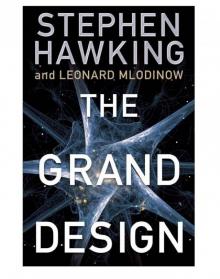 The Grand Design
The Grand Design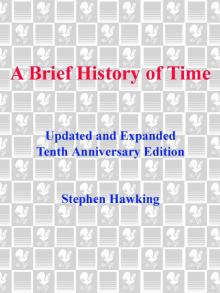 A Brief History of Time
A Brief History of Time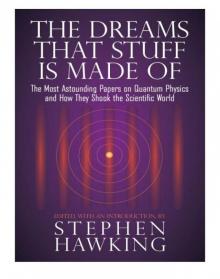 The Dreams That Stuff is Made of
The Dreams That Stuff is Made of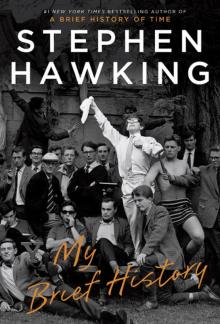 My Brief History
My Brief History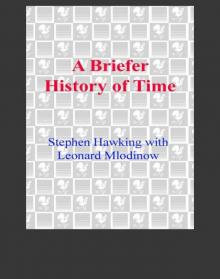 A Briefer History of Time
A Briefer History of Time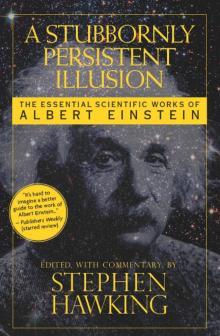 A Stubbornly Persistent Illusion
A Stubbornly Persistent Illusion George and the Blue Moon
George and the Blue Moon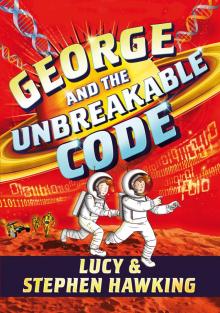 George and the Unbreakable Code
George and the Unbreakable Code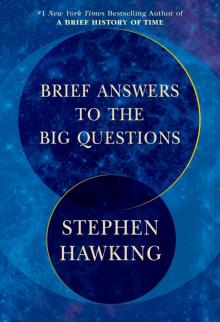 Brief Answers to the Big Questions
Brief Answers to the Big Questions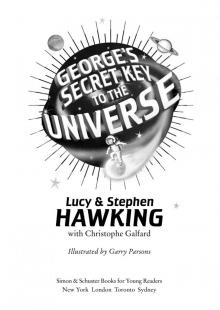 George's Secret Key to the Universe
George's Secret Key to the Universe